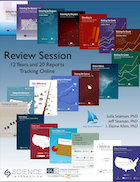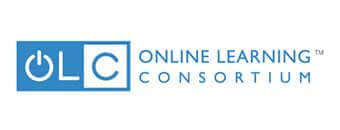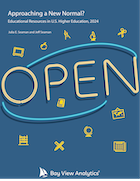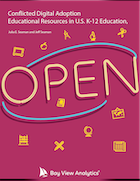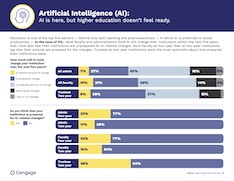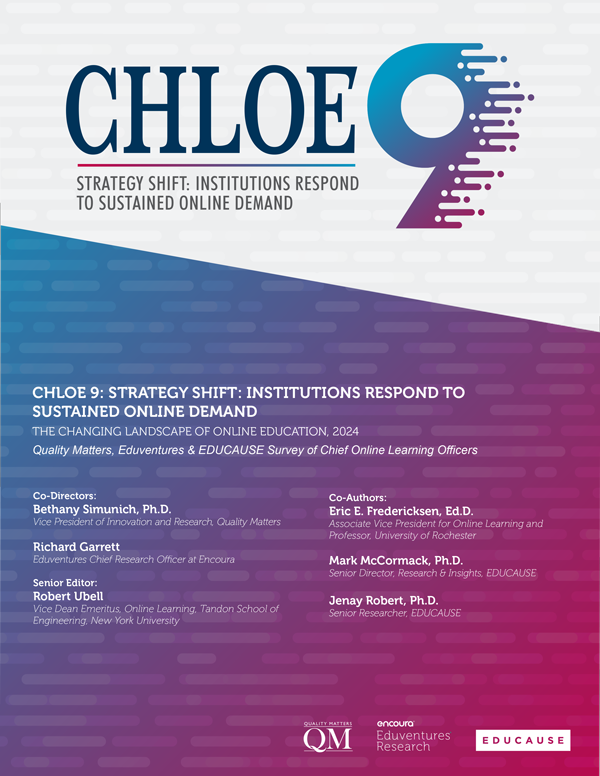Bay View Analytics offers a comprehensive suite of consulting services in survey design and statistical research. Our services build on nearly two decades of research design, sampling, survey design, and statistical analysis expertise.
Bay View Analytics joins CDLRA in announcing the 2024 Pan-Canadian Report
There is a narrative that massive change is on the horizon, if not already unfolding at an unprecedented rate. That same narrative suggests that those who do not embrace technology and the change it brings will find themselves left behind and ill-equipped to thrive in the future. But what is happening in actuality? Are we living through a time of profound digital disruption? Or are things more or less how they’ve always been?
As we navigate messages about technology adoption and its anticipated impact on teaching and learning, the 2024 Pan-Canadian Report exists to provide evidence-based insight to the Canadian post-secondary community.
183 countries, 2.7 Million downloads, 23,700 citations: The continuing impact of the Online Learning Report series
To honor the 25th anniversary of the Sloan Consortium / Online Learning Consortium’s fall conference, Bay View Analytics, with support from the Online Learning Consortium and Science Interactive, has released “Review Session: 12 Years and 20 Reports Tracking Online Learning.”This report is a compilation and review of research results and publications on the evolution of online learning in U.S. higher education. The 12 years of reports present a unique historical record of online learning enrollments and trends from 2002-2015. During this period, the project was the sole resource tracking the number of students enrolled in online courses in the U.S., eventually leading to the Department of Education tracking these statistics. In addition to monitoring online enrollments, the reports answered critical questions for academic leaders implementing online offerings for their institutions, including faculty attitudes towards online education, how others viewed the quality of online courses, and the barriers faced when launching online offerings. As online learning grew more common in higher education, the project's research focus and outreach shifted to match developing trends.
The Sloan Consortium / Online Learning Consortium conferences, research meetings, and publications provided critical guidance to an embryonic field. In addition to providing newsletters, a research journal, and publishing reports, the organization provided one of the first and most effective means for those moving into this new field to meet, compare notes, and learn from each other.
Approaching a New Normal? Educational Resources in U.S. Higher Education, 2024
Download report: Approaching a New Normal?This is the 13th report in a series of surveys tracking curricula discovery, selection, and adoption processes in U.S. higher education. The survey responses for this analysis were collected in April 2024, from a total of 3,447 faculty. The respondents come from all 50 U.S. states, the District of Columbia, and the Virgin Islands.
Key takeaways from this year’s survey are:
- Fully face-to-face courses remained the most common modality in 2024, with three-quarters of faculty teaching at least one such course. A smaller portion of faculty (40%) taught at least one course that was fully online.
- Digital options for required textbooks continue to grow. The majority of faculty (78%) have a required textbook for students for their largest enrolled course, and almost all required textbooks (92%) are offered in a digital format.
- Faculty opinions on print versus digital materials remain conflicted and stable. The majority of faculty (79%) agree digital materials offer students greater flexibility, but a large number of faculty (41%) also agree that print materials are better for student learning.
- Faculty awareness for licensing varies by the type of license. Faculty have the highest level of awareness for copyright (96% aware at any level), followed by public domain (90%), and finally Creative Commons (76%).
- In 2023-24, more than half of faculty (56%) were aware of OER at any level. However, OER awareness dropped 8% compared to 2022-23, to a level seen two years ago, in 2021-22. For the most part, differences were seen evenly across faculty characteristics like teaching modality, discipline, and institution type.
- There was a 3% decline in the rate of use of OER as required materials for 2023-24 compared to 2022-23, paralleling the decrease in OER awareness. Overall, 26% of all faculty reporting that they use OER as a required material in their courses.
Conflicted Digital Adoption:
Educational Resources in U.S. K-12 Education, 2024
Download report: Conflicted Digital Adoption: Educational Resources in U.S. K-12 Education, 2024This is the fifth report in a series tracking curricula discovery, selection, and adoption processes in U.S. K-12 education. This survey was conducted in April 2024, with a total of 1,377 teachers and 206 administrators participating. The respondents come from 48 states and the District of Columbia.
Key takeaways from this year’s survey include:
- One third of K-12 teachers are aware of open educational resources (OER), the highest level since we started measuring in 2018-19. A similar percentage of teachers report using OER materials this year as either required or supplemental materials.
- The proportion of teachers reporting any type of instruction that wasn't in-person has remained constant in the post-pandemic era, at around 10%.
- Most teachers report that they use a required textbook, and these textbooks are offered to students in both print and digital formats. Digital-only offerings are more common in higher grades, while print-only offerings are more common in lower grades. However, more than 50% of teachers across all grades offer textbooks in both formats.
- Opinions on print vs. digital materials remain conflicted as the use of digital materials grows. More than half of teachers believe students learn better from print, but an even greater number believe digital materials offer greater flexibility for students.
Majority of U.S. college students are worried about meeting their course material costs
Download report (PDF): https://www.bayviewanalytics.com/reports/2023_student_course_material_affordability.pdf.Report as a webpage: https://www.bayviewanalytics.com/reports/2023_student_course_material_affordability.html.
Press release: Majority of U.S. college students are worried about meeting their course material costs
In a recent national survey, 71% of undergraduate students in the U.S. say that they're worried about meeting their course material costs for the current academic term; 30% saying they are “moderately” or “extremely” worried about meeting the costs. Over half of students who participated in the survey say that their course material costs per term is over $200.
These findings are from the latest national survey conducted by Bay View Analytics on course material affordability for U.S. college students. This national research project, supported by Affordable Learning PA (ALPA) and the Partnership for Academic Library Collaboration and Innovation (PALCI), was conducted in conjunction with the state of Pennsylvania’s comprehensive survey on course material affordability. The goal was to raise understanding of the impact of course material choices on students' academic and general life.
Only 1 in 5 say their school is ready for GenAI
While three-quarters of higher-education trustees (83%), faculty (81%) and administrators (76%) agree that generative artificial intelligence (GenAI) will noticeably change their institutions in the next five years, community college trustees are more optimistic than their community college counterparts, with (37%) saying their organization is prepared for the change coming compared to just 16% of faculty and 11% of administrator respondents.Those findings are from the 2023-2024 Digital Learning Pulse Survey conducted by Cengage and Bay View Analytics with support from the Association of Community College Trustees (ACCT), the Association of College and University Educators (ACUE), College Pulse and the United States Distance Learning Association (USDLA) to understand the attitudes and concerns of higher education instructors and leadership.
CHLOE 9: Strategy Shift: Institutions Respond to Sustained Online Demand
Bay View Analytics is pleased to work with Eduventures Research, Quality Matters and EDUCAUSE on the Changing Landscape of Online Education (CHLOE) project. This unique and important project looks at the structure and organization of postsecondary online education in the U.S. using the insight and perspective of the senior online officer at each participating institution. The ninth installment of the CHLOE report shows the majority of survey participants report both learner demand for online learning surging and institutional strategic priorities shifting to meet this demand, as well as the adaptation to the new presence of AI tools in the academic environment.Survey description and download form: CHLOE 9: Strategy Shift: Institutions Respond to Sustained Online Demand
What We Do
Educational Research – We are a leader in survey research on current views in K-12 and higher education faculty and institutions, with a focus on open educational resources (OER).Statistical Research – We offer consulting support across all disciplines and specialize working with biotech and pharmaceutical companies.
Download Our Reports
All of our reports are free to download and use. Download our K-12 education, higher education faculty and institutions, open educational resources, research briefs, our statistical tutorials or most recent scientific publications. See recent citations and uses of our work.Partners
Bay View Analytics works with variety of companies, non-profit foundations, academic groups, reporting agencies, and more. Within our scientific projects, we work with small biotech startups to large pharmaceutical companies, in addition to academic and non-profit researchers.
Presentations
Bay View Analytics participates in multiple conferences. Our presentations cover our most current research on distance learning and open educational resources in US K-12 and higher education, as well as offering an overview of trends over the last decade.
Connect With Us
You can follow us on ![]() Twitter and
Twitter and ![]() LinkedIn. We also invite your feedback and comments.
LinkedIn. We also invite your feedback and comments.
Recent Publications
Open Educational Resources
- Approaching a New Normal? Educational Resources in U.S. Higher Education, 2024
- Conflicted Digital Adoption: Educational Resources in U.S. K-12 Education, 2024
- Research Brief: Digital and OER Textbook Adoption
- Research Brief: Faculty Satisfaction with Course Materials varies by Publisher
Course Material Affordability
Digital Learning Pulse Surveys
- Infographic: 2023-2024 Digital Learning Pulse Survey
- The Digital Transformation of the Community College
- Planning for a Smaller Future: Dealing with Declining Enrollments
STEM
- Teaching Online: STEM Education in the Time of COVID
- What Makes a STEM Student
- Perceptions of the Future of STEM Education
Distance Education
- Digital Faculty: Faculty Social Media Use and Communications
- Infographic: Digital Faculty
- Grade Increase: Tracking Distance Education in the United States
Follow us on
Privacy
All survey respondents are provided complete anonymity. No personally identifiable information is released. Full privacy policy.

